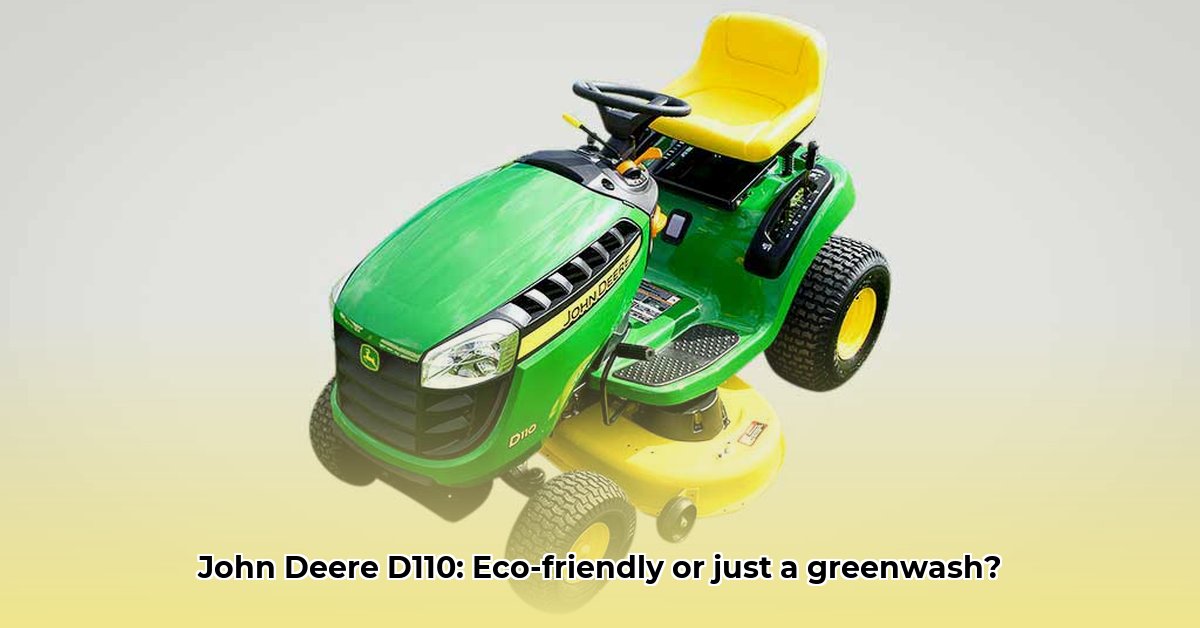
Features and Specifications
The John Deere D110 is a compact lawn tractor designed for smaller lawns. Measuring approximately 69 x 51 x 42 inches (1750mm x 1310mm x 1080mm) and weighing around 452 pounds (205kg), it offers maneuverability without excessive soil compaction, a benefit for lawn health. Its 0.5 to 0.54 liter engine powers a variety of attachments, including a mowing deck, snow blade, and front plow, increasing its versatility and potentially reducing the need for multiple pieces of equipment. The 9-liter fuel tank suggests potential for extended use between refills, but lacks quantifiable data to determine actual fuel efficiency. For a comparison with a larger model, see the specs on the John Deere X350.
Performance and Efficiency
While the smaller engine size suggests improved fuel economy compared to larger tractors, concrete data on fuel consumption (gallons per acre mowed) is needed for a comprehensive comparison. This review lacks the necessary data to definitively assess its fuel efficiency relative to similar gas-powered models, electric mowers (which have zero emissions during operation), or manual mowing (which has zero emissions altogether). Without such figures, a direct comparison proving its efficiency remains impossible. How much fuel does it actually consume per acre mowed, and how does that figure stack up against other options?
Sustainability Analysis
The D110's primary environmental concern is its reliance on gasoline, which directly contributes to greenhouse gas emissions. While the smaller engine might use less gasoline per hour than larger models, it still generates emissions. Lack of complete data on the manufacturing process and its overall carbon footprint presents a challenge in fully evaluating its sustainability. Furthermore, the absence of an electric alternative from John Deere limits the options for environmentally conscious consumers who prefer this power source. Electric mowers, while having a higher initial cost, offer zero tailpipe emissions during use. However, their battery production, lifespan, and eventual disposal present complexity to their total environmental impact.
Pros and Cons
Pros:
- Compact size minimizes soil compaction.
- Versatile attachments reduce the need for multiple machines.
- Potentially lower fuel consumption (requires further data verification).
Cons:
- Gasoline engine contributes to greenhouse gas emissions.
- Lack of data on manufacturing environmental impact.
- Absence of an electric model from John Deere limits sustainable choices.
Comparison to Alternatives
Electric lawn tractors present a compelling alternative, offering zero direct emissions during operation. However, the higher upfront cost and the environmental impact of battery production and disposal require careful consideration. Manual push mowers offer a completely emissions-free solution for smaller lawns, but necessitate greater physical effort. The ideal choice depends on individual needs, lawn size, physical capabilities, and long-term cost considerations.
Conclusion
The John Deere D110 offers some features appealing to environmentally conscious consumers, such as its compact size and versatile attachments. However, its reliance on gasoline and the lack of an electric option significantly limit its sustainability appeal. The lack of concrete data regarding fuel efficiency and manufacturing impact prevents a definitive assessment of its overall environmental footprint. For individuals prioritizing sustainable lawn care, a thorough evaluation of electric alternatives, or even manual mowing, is crucial. The need for greater transparency from manufacturers regarding environmental impact throughout the entire product lifecycle is evident. John Deere's ongoing failure to offer an electric equivalent of the D110 represents a missed opportunity to address growing consumer demand for sustainable lawn care solutions.